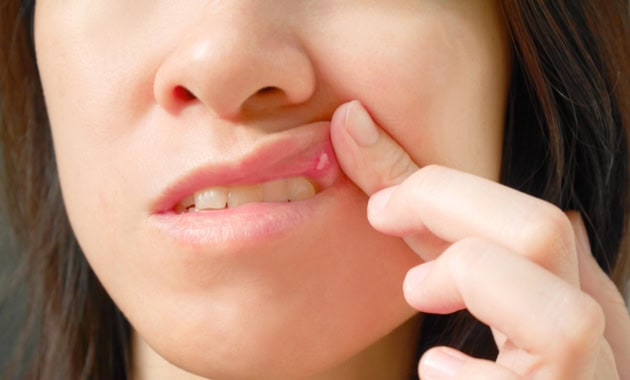
20th March 2020 is observed as World Oral Health Day. The theme for this year is “Unite For Mouth Health”.
Just like any other day, Sandhya was called for lunch by her colleagues but she did not go. She said she doesn’t feel like eating. It was twice in a week that she was skipping her meals. Before you get it wrong, it was not because of work pressure but because she had mouth ulcers and she felt like not eating anything. Off late, Sandhya has been suffering from frequent mouth ulcers. She is trying all the natural remedies recommended by her friends and relatives to get rid of mouth ulcers. But when her close friend got to know about this reason, she strongly recommended consulting a doctor as frequent mouth ulcers should not be ignored. And when she consulted her doctor, it was revealed that she suffered from Vitamin B 12 deficiency.
Mouth ulcers are a common oral problem that most of us might have experienced. There are times when you get up in the morning and spot a white, yellow or red painful ulcer in your mouth. It is clinically known as aphthous ulcers, which is derived from a Greek word “aphtha” which means ulceration. Most of the mouth ulcers can be due to poor oral hygiene or lack of nutrients but it can also be triggered by hormonal imbalance or an underlying condition such as Crohn’s disease.
What causes ulcers in the mouth?
Mouth ulcers can be caused by an infection, injury, or allergic reaction. In most cases, the exact cause of the mouth ulcers is unknown. Here are some common and known causes of mouth ulcers.
Poor oral hygiene: Lack of proper oral hygiene is one of the most common and preventable causes of mouth ulcers. Factors such as not brushing the teeth properly or excessive brushing can also cause mouth sores. Moreover, the presence of certain ingredients such as sodium lauryl sulphate in the toothpaste or mouthwash can trigger an allergic reaction and increase the risk of recurrent mouth ulcers.
Nagging Tooth Ache? Constant Pain? Check out the latest oral care products at 1mg
Certain medicines: In some cases, medicines used to treat certain health problems can cause mouth ulcers. These include antibiotics, painkillers, beta-blockers, iodides, and anticonvulsants. Also, radiation therapy and drugs used to treat cancer (chemotherapy drugs) can also lead to mouth ulcers.
Dental injury or implants: Yes, any injury to the oral cavity including teeth, gums, lips or cheeks can increase the risk of mouth ulcers. This can include cheek biting or lip biting habits or broken teeth. Also, use of dentures or braces which are not fitted properly can also cause mouth ulcers. Moreover, if you are allergic to any material or ingredients of the dental appliances such as nickel, then the chances of suffering from mouth ulcers is high.
Nutritional deficiencies: Diet plays a key role in ensuring overall health including the oral health. This is the reason why lack of certain nutrients in the body can cause mouth ulcers, including recurrent mouth ulcers. Nutritional deficiencies of common minerals and vitamins such as iron, vitamin B, and vitamin C can also cause one of the common causes of mouth ulcers. Hence, it is important to ensure proper intake of nutrients from diet and prevent the risk of mouth ulcers.
Tobacco use: It goes without saying that tobacco and smoking are injurious to health. Use of tobacco causes mouth ulcers due to the exposure of harmful chemicals and toxins present in it. These chemicals also affect the lining of the mouth and change the temperature and acidity of the mouth, further increasing the risk of infection. Moreover, the irritants present in tobacco can also increase your risk of oral and mouth cancer.
Infections: Mouth ulcers can be caused due to a weakened immune system or hormonal changes in the body following stress or anxiety. Whether it is due to bacterial, viral, or fungal infection or underlying systemic diseases, mouth ulcers do indicate a serious health problem. Some of the common medical conditions that can cause mouth sores are:
– Intestinal disease: Crohn’s disease, celiac disease, or inflammatory bowel disease
– Bacterial infections: Gonorrhea or syphilis
– Viral infections: Herpes, chickenpox, shingles, or human immunodeficiency virus (HIV) infection
– Fungal infections: Candida infection
When to see a doctor?
Mouth ulcers that accompany with certain symptoms such as fever, blisters on the skin or inflammation of the eyes, should not be left ignored. It is wise to consult a doctor if mouth ulcers are:
-Painful
-Recurrent
-Interfere while eating
-Interfere when swallowing food
-Cause trouble when speaking
-Also accompanied by generalized weakness
If mouth sores last for more than 10 days, it is important to diagnose it and know the underlying causes of mouth ulcers as it could also be a sign of cancer.
(The article is been reviewed by Dr. Lalit Kanodia, General Physician)
Recommended Reads:
5 Natural Remedies To Get Rid Of Painful Mouth Ulcers
Painful Mouth Ulcer? Here Is What You Should Do
References:
1. Scully C, Shotts R. ABC of oral health. Mouth ulcers and other causes of orofacial soreness and pain. BMJ. 2000 Jul 15;321(7254):162-5.
2. Siu A, Landon K, Ramos DM. Differential diagnosis and management of oral ulcers. Semin Cutan Med Surg. 2015 Dec;34(4):171-7.
3. Tarakji B, Gazal G, Al-Maweri SA, Azzeghaiby SN, Alaizari N. Guideline for the diagnosis and treatment of recurrent aphthous stomatitis for dental practitioners. J Int Oral Health. 2015 May;7(5):74-80.
4. Schneider LC, Schneider AE. Diagnosis of oral ulcers. Mt Sinai J Med. 1998 Oct-Nov;65(5-6):383-7.
5. Preeti L, Magesh K, Rajkumar K, Karthik R. Recurrent aphthous stomatitis. J Oral Maxillofac Pathol. 2011 Sep;15(3):252-6.